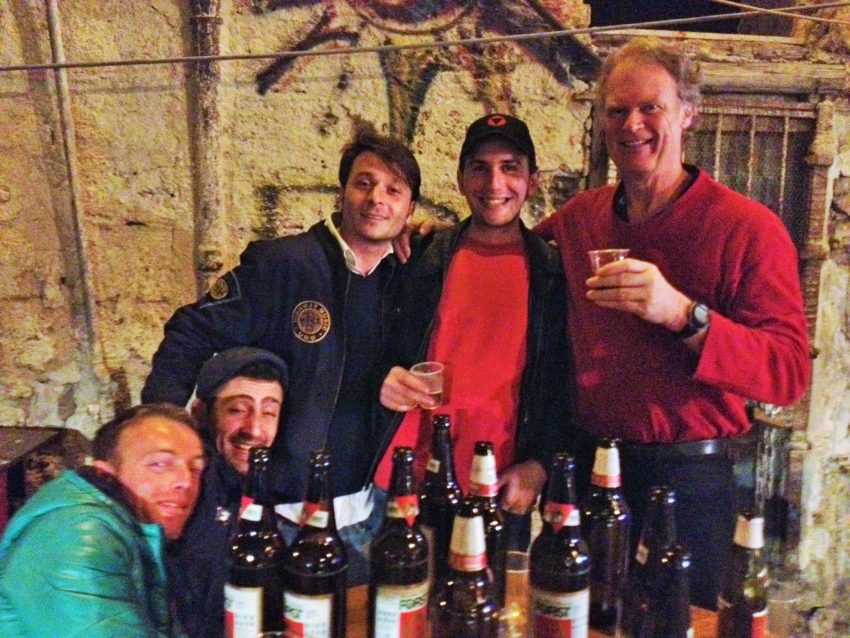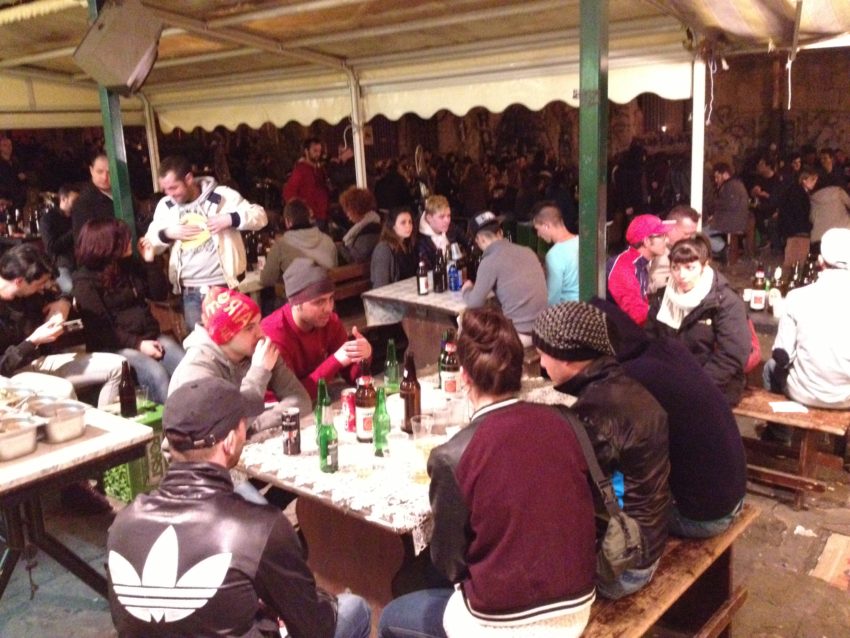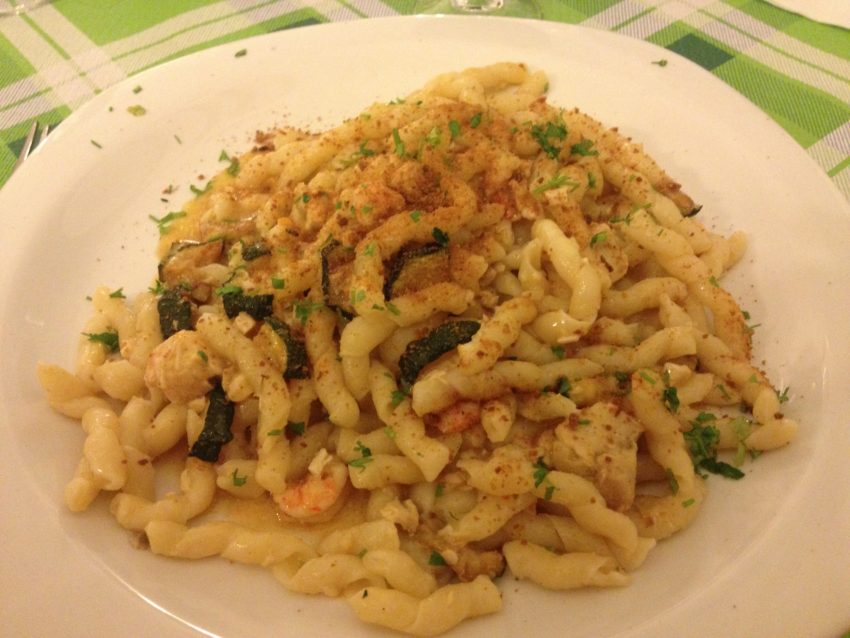Retired in Rome Journal: Wild night out in Sicily is a trip into the mysterious island’s dark side




PALERMO, Italy — I’m sitting outside a tiny takeaway shop near Palermo’s train station. This is one of the few places I’ve seen in Sicily that doesn’t have anything appealing in its display cases. There are some tired-looking French fries, some dangerous onions and some suppli (rice balls filled with meat and cheese) that look like they’d go straight to your stomach, whole, and stay there. But it does have bottles of the Milan beer, Forst, for 1 euro.
Why I’m having a beer to fend off the 12-hour remains of a nasty hangover is a question only my pharmacist can answer. I had a wild night in Palermo, once a town where wild nights usually included a trip to the hospital, morgue or both.
This used to be a rough town. As early as the ‘90s, the Mafia roamed the streets in broad daylight, shaking down businesses ranging from major retailers to the butcher in the public market. No one stood in their way. Judges, prosecutors, journalists have died at the hands of the many families that have fought for control of this island since the early 1800s.
As I wrote before, the nasty bombing of Judge Giovanni Falcone and his wife in 1992 didn’t look good on the Mafia’s resume. They’ve gone underground. The city has rebounded and has now dropped well below Naples, Milan and Rome on the crime meter. It’s a pretty safe city which is why I had no problem going into the heart of the ghetto last night.
Palermo’s Ballaro neighborhood once was home to Norman court officials in the 11th century. Now it’s home to Palermo’s growing number of African immigrants who are trying to add some spice and life to the darkest, dustiest streets in the city. It’s just across the major boulevard, Corso Turkory, from my B&B and I quickly went from a bustling street full of retail stores, small groceries and cafes to dark, narrow streets lit by lone lamp posts hanging next to dreary beat-up apartment houses. Youths hung out on street corners speaking a variety of dialects from across the breadth of West Africa. Street signs were nowhere to be found. It took five minutes before I realized I had no earthly idea where they hell I was or what direction I was going.
However, I felt very safe. You can’t legally buy a handgun in Italy and these immigrants didn’t bring any organized crime with them when they arrived. I asked a tall lanky man in a neat Fu Manchu how I get to Via Albegheria, Ballaro’s main drag and he answered in near perfect English. He was from Ghana and as he walked me to the right corner, he said he’d been here three years and spoke fluent Italian. That’s more than I can say for some North Americans here. I asked him how he liked Sicily.
“It takes some time,” he said. “There isn’t much work. Life is hard.”
But they have family. I saw numerous nuclear families standing outside bundled up in the relatively cool 50-degree night. One door led to some flashing neon lightbulbs which seemed like a tiny disco that was just warming up. A group of youths appeared more interested in flirting with their women than me walking past them with my head on a swivel looking for any kind of a street sign.
I finally stumbled across a scruffy piazza packed with people filling plastic chairs on dirty streets void of traffic. Cheap, run-down bars and take-away food stands lined a teeming party area dimly lit by the random collection of street lights. I remember this place from my trip here after the 2006 Turin Olympics. Back in the ‘70s, ‘80s and ‘90s, this square used to be Palermo’s nasty drug den. In the mornings you had to step over used syringes and strung-out junkies, victims of a violent drug trade. The Mafia has left and Palermo’s drinking crowd returned.
However, street signs still haven’t. I couldn’t find the restaurant recommended to me by the Palermo soccer team’s PR guy. I walked into a take-away food shop and a young kid in a neat crewcut told me he knew the place and to hop on his Vespa.
We flew through the pitch-black streets, popping up and down in potholes and whizzing around tight corners where single lights illuminated dark, cramped apartments. He spoke a little English but when I told him I preferred Italian he said these streets are really safe. But they’re confusing. I probably wouldn’t find it if I went alone.
“Why are you in Palermo?” he asked.
“I’m doing a story on your soccer star, Kyle Lafferty.”
Suddenly, I was Bwana. He turned his head almost 180 and said, “KYLE LAFFERTY! IL BOMBERA! MOLTO FORTE! (THE BOMBER! VERY STRONG!) He said he goes to games now that they’re in Serie B and the people of Ballaro can afford it.
He turned a corner and pointed to a building with a tiny sign reading Al Vicolo. I gave him all the change that I had which amounted to about 75 cents. He didn’t seem to care. He said, “Buona sera” and sped off, leaving me alone in a dark block looking at a building that looked more like an abandoned mechanics shop than a restaurant.
Al Vicolo is where you go for real Sicilian food, the PR man told me. It’s cheap and right in the middle of the poorest neighborhood in Palermo. I walked in at 9 p.m., a little early for Sicily. Only one couple was in the brightly lit restaurant that was spotless and neat with waiters in ties buzzing around with giant platters of dishes I’ve never seen in my life. I saw big piles of tiny dried fish that looked like something you’d feed a family of cats.
I knew the place was authentic when the vino rosso della casa (house red wine) was so cheap it had no name. It was one euro. ONE, for half a carafe. Palermo cuisine is dominated by seafood, obviously, being an island, and I dove in with the Busiati al Vicolo. Busiati is the Sicilian pasta shaped like small tightly rolled tubes. They’re easy to eat and hold up to thick sauces like this. This heaping plate in a light broth was packed with chunks of swordfish, shrimp, tuna and zucchini.
Portions in Italy are usually so large you don’t need a second plate as is tradition. But Al Vicolo is so cheap (two main dishes, two half carafes of wine and coffee for 16 euro about $21), I couldn’t resist. I ordered a mixed grill of beefsteak, sausage and spiedini, Sicily’s breaded meatball that comes packed with ham and cheese and skewered by a small wooden spear.
The waiter was a short, chatty man in his 40s who looked ready to defend Palermo to the death.
“Everyone thinks Sicily is a Mafia state,” he said. “No more. Twenty years ago, yes. No more. Not now.”
The owner, a burly man in a blue sportcoat, came over and tossed a number of little sugar packets onto the saucer holding my espresso. I told him I’m an American but I don’t eat that much sugar. He pointed to the outside of the packets and each one had a Sicilian saying, written in the Sicilian language that sounds like someone took Italian and cut off all the vowel endings.
“I parenti sunnu comu e scarpi, chiu sunny stritti chiu astruppianu.” (The closer parents are to you, the bigger the pain.) “A li ricchi ricchizzi a li scarsi scarsizzi.” (Who is rich is always rich and who is poor is always poor.)
That seemed particularly appropriate in this neighborhood.
As I took the owner’s seemingly straight forward directions back to that rollicking piazza, I passed rundown apartments with that clipped Sicilian dialect pouring in various levels of screaming. Sicilian songs flowed into the cool air. Laundry hung from tenement balconies. I saw no one. However, when I reached the piazza I fell into a swarming mass of humanity. A clean-cut kid in his 20s came up to me and said, “Hashish?” I laughed. I told him I was from Colorado where they legalized it Jan. 1. Besides, I can’t get high anymore. It just doesn’t work.
“Non puoi andare altre?” he said. Si, I told him, I can’t go to “an altered state.” He handed me a piece of tar-black hashish the size of a chocolate square. Just out of curiosity I asked the price. Twenty euros, he said. Yes, everything is cheaper in Sicily.
I walked into a tiny cramped bar called Taverna Conti where four kegs with spigots hung over a cooler. An old Coca-Cola poster hung from a wall next to a faded black and white framed photo of what looked like someone’s mom. She had the expression of a mother who’d just watched her two sons gunned down in this square many years ago.
The bartender, looking as out of place as I did with his blond hair, poured me a glass of table wine in a little plastic cup and charged me one euro. Again, ONE.
I started snapping bad pictures with my cell phone and one of the men who moved out of the way asked if I wanted a beer. For 90 minutes I stood around a table covered with liter bottles of Fost and Peroni and talked to Marco, Giorgio, Davide and two of their friends who remained sullen and silent. They were all Sicilians and remarkably sober considering it was reaching 1 in the morning. One of the biggest social faux pas you can commit in Southern Italy is public drunkenness. Southern Italian women just won’t put up with it. But I looked around. The place was 80 percent men.
Marco is a chef in a pizzeria in Rome where he had to go for work. The employment situation in Sicily is even worse than in Rome which is remarkable. I didn’t mention anything but it seems Sicily’s economy started going downhill about the same time the Mafia did.
They spoke in a hodgepodge of Sicilian and Italian. Somehow, I was able to follow the conversation better than some of the Columbia School of Broadcasting grads on Italian TV. Maybe I should walk around Italy drinking 1-euro wine all day. But they talked about the difficulties of finding work. Davide works in sales for a technology firm and Giorgio doesn’t do anything. He pointed to his fisherman’s cap. “Sono un Siciliano tipico,” he said. (“I’m a typical Sicilian.”) I didn’t mention I have the same cap. They are too young to have come down to this piazza when it was the place to score high-grade heroin but they said they’ve heard stories about the Mafia passed down from their parents. They’ve never even suspected seeing someone from the Mafia around town. I tried buying them all a beer but they remained restrained. Maybe they had dates later.
I walked through the dark at 1:30 a.m. back to my BnB which, just a few hundred meters away, seemed like in another continent rather than another neighborhood.

